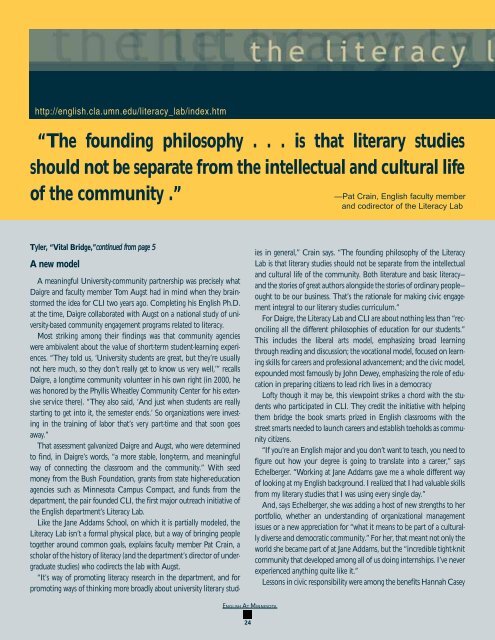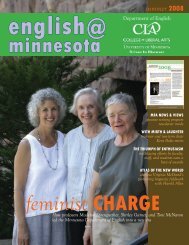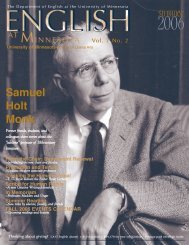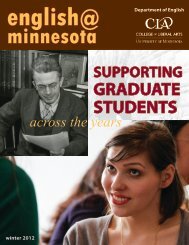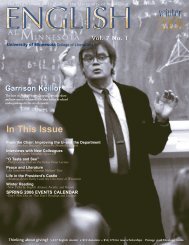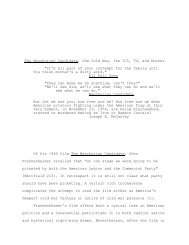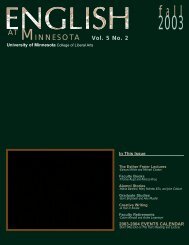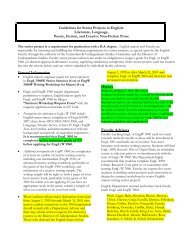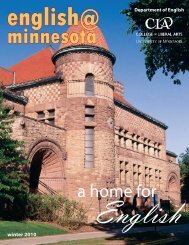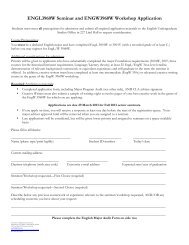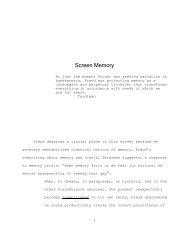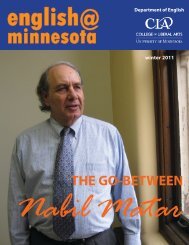spring M - Department of English - University of Minnesota
spring M - Department of English - University of Minnesota
spring M - Department of English - University of Minnesota
Create successful ePaper yourself
Turn your PDF publications into a flip-book with our unique Google optimized e-Paper software.
http://english.cla.umn.edu/literacy_lab/index.htm“The founding philosophy . . . is that literary studiesshould not be separate from the intellectual and cultural life<strong>of</strong> the community .”—Pat Crain, <strong>English</strong> faculty memberand codirector <strong>of</strong> the Literacy LabTyler, “Vital Bridge,”continued from page 5A new modelA meaningful <strong>University</strong>-community partnership was precisely whatDaigre and faculty member Tom Augst had in mind when they brainstormedthe idea for CLI two years ago. Completing his <strong>English</strong> Ph.D.at the time, Daigre collaborated with Augst on a national study <strong>of</strong> university-basedcommunity engagement programs related to literacy.Most striking among their findings was that community agencieswere ambivalent about the value <strong>of</strong> short-term student-learning experiences.“They told us, ‘<strong>University</strong> students are great, but they’re usuallynot here much, so they don’t really get to know us very well,’” recallsDaigre, a longtime community volunteer in his own right (in 2000, hewas honored by the Phyllis Wheatley Community Center for his extensiveservice there). “They also said, ‘And just when students are reallystarting to get into it, the semester ends.’ So organizations were investingin the training <strong>of</strong> labor that’s very part-time and that soon goesaway.”That assessment galvanized Daigre and Augst, who were determinedto find, in Daigre’s words, “a more stable, long-term, and meaningfulway <strong>of</strong> connecting the classroom and the community.” With seedmoney from the Bush Foundation, grants from state higher-educationagencies such as <strong>Minnesota</strong> Campus Compact, and funds from thedepartment, the pair founded CLI, the first major outreach initiative <strong>of</strong>the <strong>English</strong> department’s Literacy Lab.Like the Jane Addams School, on which it is partially modeled, theLiteracy Lab isn’t a formal physical place, but a way <strong>of</strong> bringing peopletogether around common goals, explains faculty member Pat Crain, ascholar <strong>of</strong> the history <strong>of</strong> literacy (and the department’s director <strong>of</strong> undergraduatestudies) who codirects the lab with Augst.“It’s way <strong>of</strong> promoting literacy research in the department, and forpromoting ways <strong>of</strong> thinking more broadly about university literary studiesin general,” Crain says. “The founding philosophy <strong>of</strong> the LiteracyLab is that literary studies should not be separate from the intellectualand cultural life <strong>of</strong> the community. Both literature and basic literacy—and the stories <strong>of</strong> great authors alongside the stories <strong>of</strong> ordinary people—ought to be our business. That’s the rationale for making civic engagementintegral to our literary studies curriculum.”For Daigre, the Literacy Lab and CLI are about nothing less than “reconcilingall the different philosophies <strong>of</strong> education for our students.”This includes the liberal arts model, emphasizing broad learningthrough reading and discussion; the vocational model, focused on learningskills for careers and pr<strong>of</strong>essional advancement; and the civic model,expounded most famously by John Dewey, emphasizing the role <strong>of</strong> educationin preparing citizens to lead rich lives in a democracyL<strong>of</strong>ty though it may be, this viewpoint strikes a chord with the studentswho participated in CLI. They credit the initiative with helpingthem bridge the book smarts prized in <strong>English</strong> classrooms with thestreet smarts needed to launch careers and establish toeholds as communitycitizens.“If you’re an <strong>English</strong> major and you don’t want to teach, you need t<strong>of</strong>igure out how your degree is going to translate into a career,” saysEchelberger. “Working at Jane Addams gave me a whole different way<strong>of</strong> looking at my <strong>English</strong> background. I realized that I had valuable skillsfrom my literary studies that I was using every single day.”And, says Echelberger, she was adding a host <strong>of</strong> new strengths to herportfolio, whether an understanding <strong>of</strong> organizational managementissues or a new appreciation for “what it means to be part <strong>of</strong> a culturallydiverse and democratic community.” For her, that meant not only theworld she became part <strong>of</strong> at Jane Addams, but the “incredible tight-knitcommunity that developed among all <strong>of</strong> us doing internships. I’ve neverexperienced anything quite like it.”Lessons in civic responsibility were among the benefits Hannah CaseyENGLISH AT MINNESOTA24


